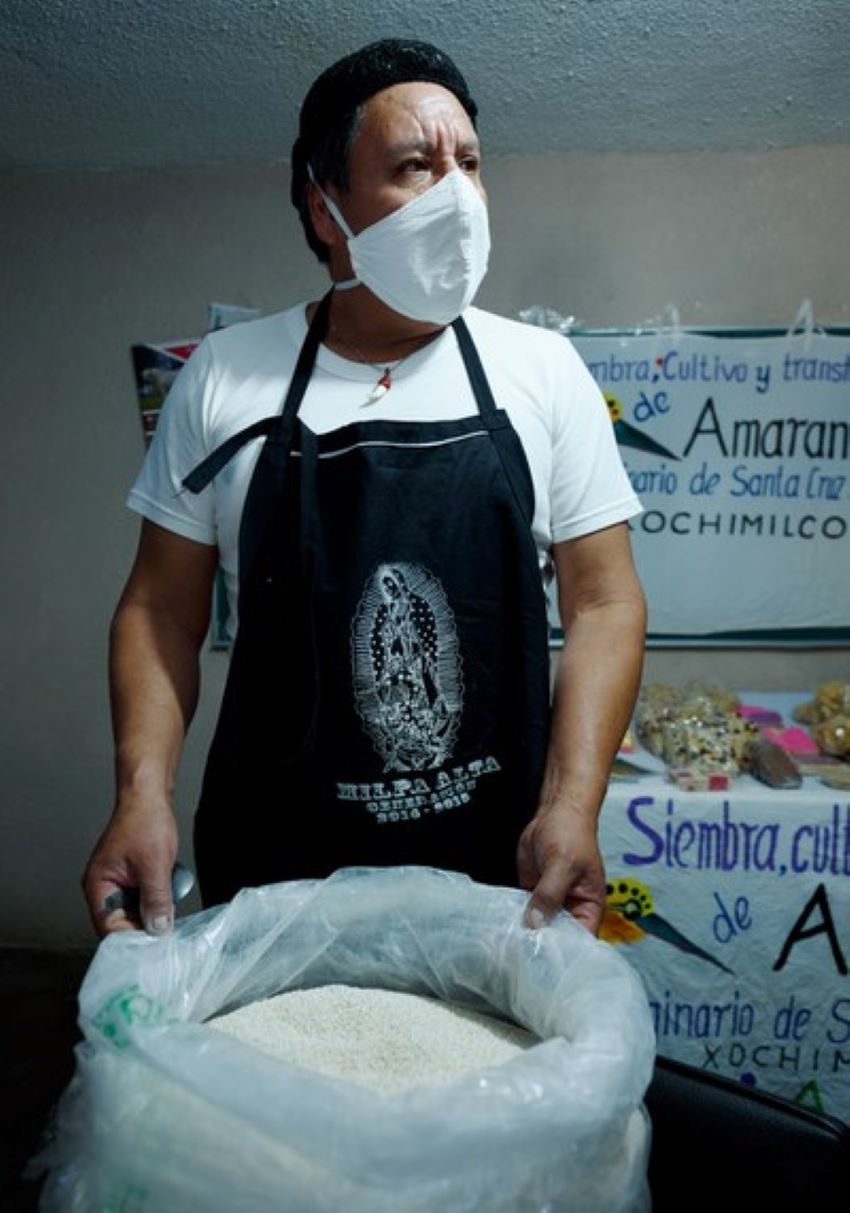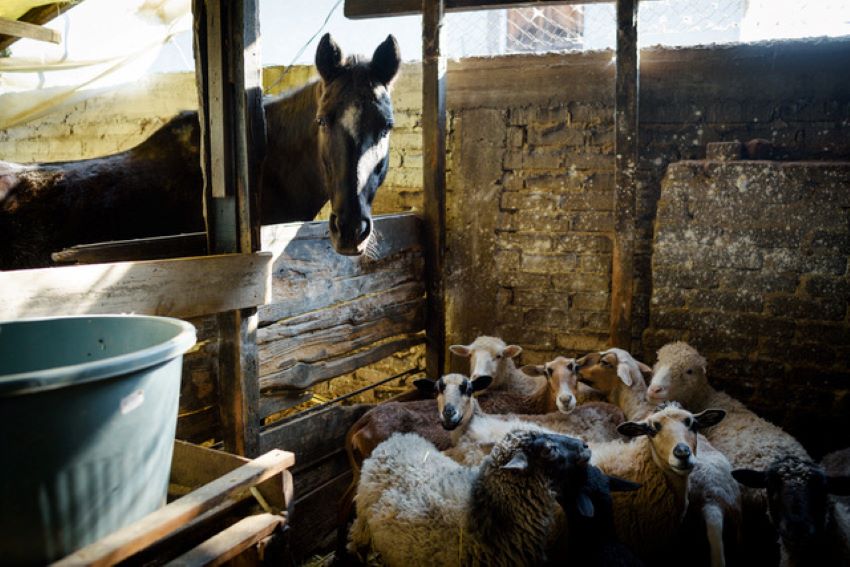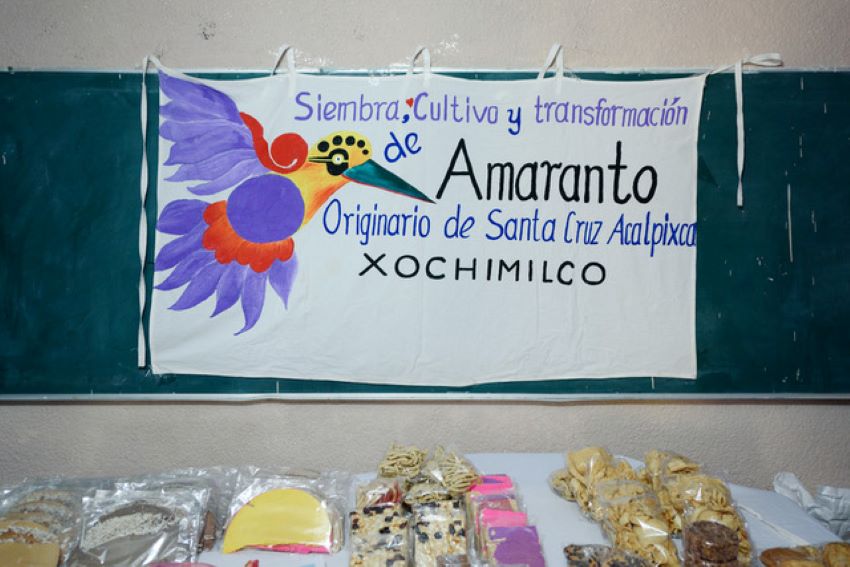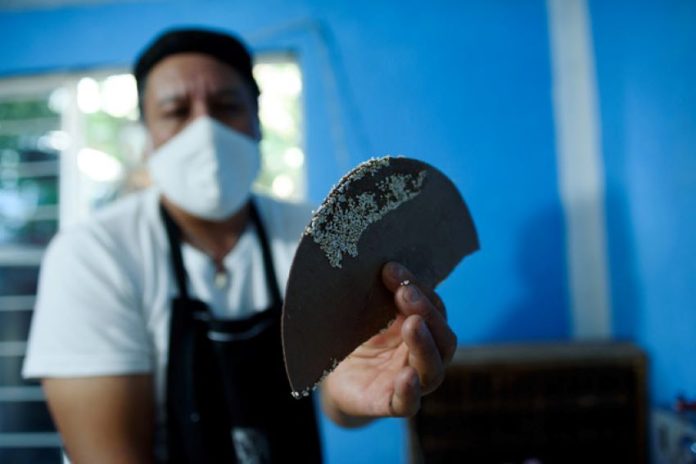As we bump along the edge of the canyon road, it feels and sounds like Juan Rocha’s ’84 VW bus is leaving parts of itself behind. The ride down to his land – seven hectares sitting on the edge of a valley in a rural part of Santa Cruz Acalpixca – is so noisy that there’s no use in trying to talk or even think. Instead, we look out the window at the scruffy land below, scruffy now because it’s the heart of the dry season and most of the vegetation, including the corn yet to be harvested, has turned a dusty tan.
As the dust swirls away from the opening bus doors, we are met with a view that expands across a checkerboard valley that includes dozens of small farms like his.
“If you saw this land in the rainy season you would never want to leave,” says Juan. Even in the dry season, it’s beautiful.
The trip out is one that Juan usually takes on horseback from his house in the pueblo of Santa Cruz Acalpixca at the southern edge of Mexico City. His gentle-faced horse, Muñeca (Doll), is his companion most days out in the fields that have been worked by his family for three generations.
The main crops are corn and amaranth, a pseudo grain endemic to Mexico. There are also a handful of staples the family grows for its own consumption. Juan and his wife, Alva, both come from families that have grown amaranth in Mexico City and Michoacán for generations.

“We have tried to keep the farming tradition alive,” says Juan, “not let it go. Because the land provides for us. It’s a lot and it’s hard, but it continues to feed us.”
This year, the family’s normal means of income, selling the sweets they make from amaranth, has been a bust. With no festivals to attend and fewer buyers on the street, they have sold next to nothing despite their best efforts. Juan says that it’s actually been difficult for a few years since the city government required them to form a cooperative – D’Alva Productos de Amaranto – and register with the tax authority.
Juan was told that the requirement was obligatory if they wanted to sell in any of the citywide festivals. But it meant that they had to begin paying taxes and accountants even before they received the support that the government promises the incorporating cooperatives – and the money, the equivalent of US $750–$1,000 won’t arrive for at least a year and a half. This year, most of their golden-brown amaranth, considered a superfood by the health food industry, has been sold as seed instead of being made into the bars and sweets that they usually produce.
Alegrías are the most ubiquitous form of amaranth that you will find in Mexico. These dense bars of puffed amaranth seeds are held together with honey and topped with peanuts and raisins; Juan and Alva add an extra touch by using cranberries instead. You can find these traditional sweets in every market and at every Metro stop in the city. They’re a filling and nutritious snack that has probably been around in some form or another for over 500 years.
Juan and Alva try to impress upon their customers that the secret to their alegrías is the artisanal production. Everything, from the planting of the seeds to the production of sweets in their home workshop, is done by hand. The workshop now sits spotlessly clean and organized, waiting for the day when they will be back to mass-producing.
The taste of their alegría bars is nuttier and fresher than any other I’ve had in Mexico, and the slightly higher price — about a dollar in comparison to the sometimes 10 cents for which you can find them on the street — reflects the quality of their ingredients.

“I had a consumer that wanted me to sell him alegría at the price you buy in the Metro, about 3 pesos,” says Alva. “So I said, OK, bring me one of those bars. When I crushed the bars, I separated about 70% of it out and said, this part in those Metro bars is mostly Styrofoam. This 20% is garbage and rat poop. And the rest of it, might be real amaranth.”
Everyone gags a little at the idea of eating Styrofoam and rat poop, and I silently vow never to buy a bar of alegría in the Metro again.
“I don’t even like to make them weeks in advance,” says Juan about the various obleas, alegrías and a date and amaranth candy they invented called angelitos. “They don’t go bad, but I don’t like to do it that way. I want whoever eats this to be eating something fresh. That they enjoy it and say ‘Wow!’
“You just won’t find that anywhere else, only here. You will find the competition but not the same flavor. You carry the flavor with you.”
One-on-one conversations and tastings have been Juan and Alva’s biggest promotional opportunities during their five years of business. With Covid-19 essentially canceling the year, this face-to-face exchange has been impossible. They were recently invited to sell at a two-weekend Christmas tree fair, but the second weekend was canceled by the government because of a rise in cases.
Their situation is not an isolated one for farmers in the Valley of México during the pandemic. Ángel and Ernesto Galicia in Xochimilco farm one of the canals’ manmade islands. While they were at least able to receive a small sum from the government during the pandemic, it hasn’t been enough to meet their needs.

“We have to keep farming, though,” says Angel, “The land doesn’t stop. The animals need to be fed.”
The Galicias, who were previously producing mostly specialty vegetables for the local restaurant market, have now expanded their crops to include the produce that they as a family eat on a regular basis, things like Roma tomatoes, cilantro and chiles.
Many farmers in this area have suffered from reduced demand in Mexico’s largest commercial markets like the Central de Abastos, which shut down for the first time in 40 years during the pandemic. Smaller markets in the center of the city have also been shut down, albeit for short periods of time, because of Covid, and overall sales have been drastically reduced for everyone along the supply chain.
Juan recently sold the bulk of his amaranth seed to folks from the state of Michoacán who came to the city to buy it for their own land. They were also able to sell about 40 crates of tomatoes from this year’s crop out of the back of their pick-up by driving around the neighborhood.
Just like the Galicias, Juan and Alva have animals to feed and water — the horse, a dozen or so sheep, a handful of turkeys, geese and chickens and a mule. They slowly started to eat the turkeys and sheep once they were unable to sell them for meat, but all these animals take maintenance and water, another resource in short supply during this dry season, when water in Santa Cruz Acalpixca can be turned off for up to three weeks at a time.
All these factors have come to a head to make 2020 particularly difficult for this family. Their plot of land helps to keep them alive, and their business offers a tiny trickle of income, but like everyone else, they are holding their breath and hoping the Covid storm will pass with the coming of the new year.
“Until the pandemic ends, it’s going to be very difficult and we are going to have to adjust,” Juan says. “We are waiting for 2021, and then we will see.”
Mexico News Daily
